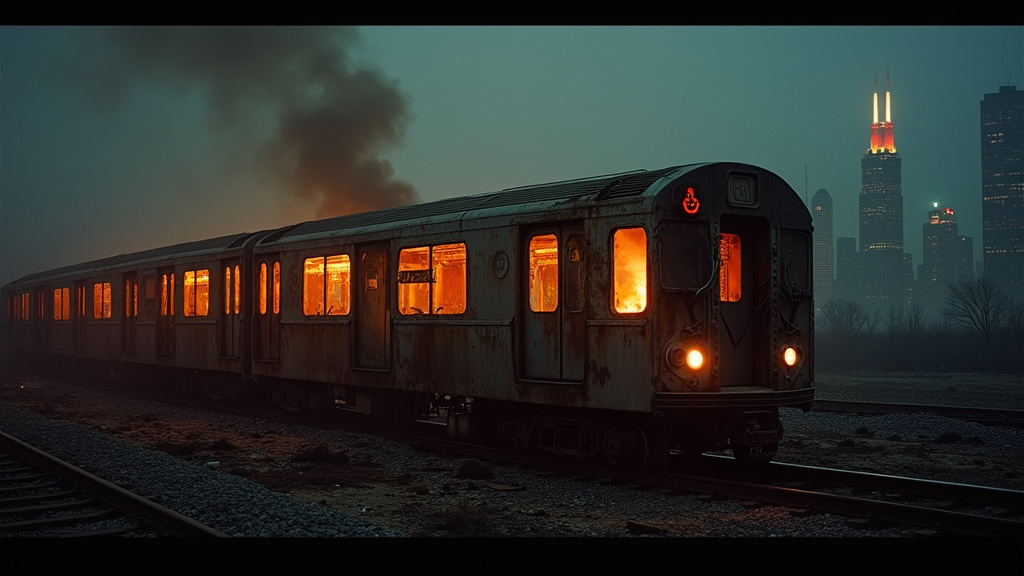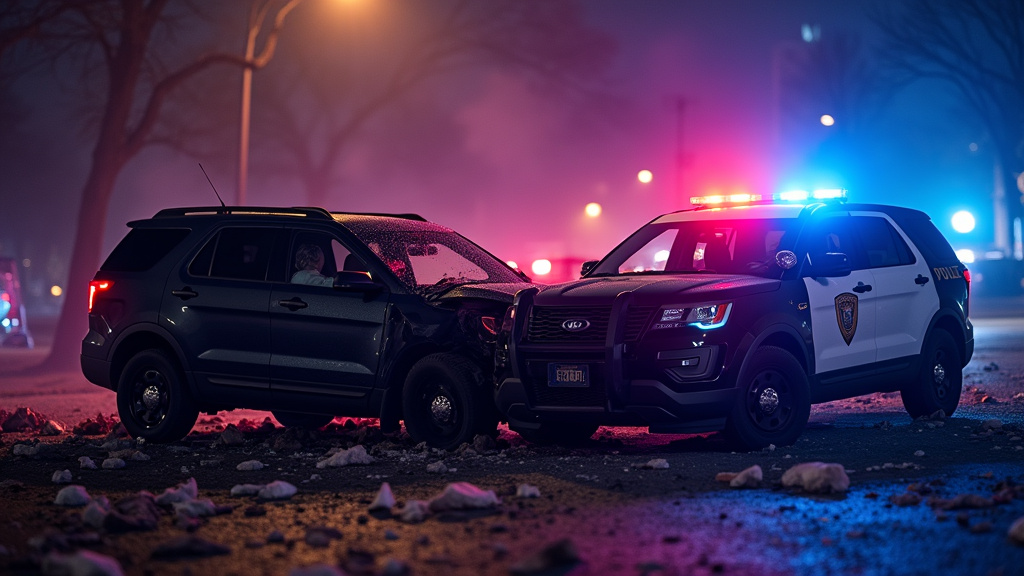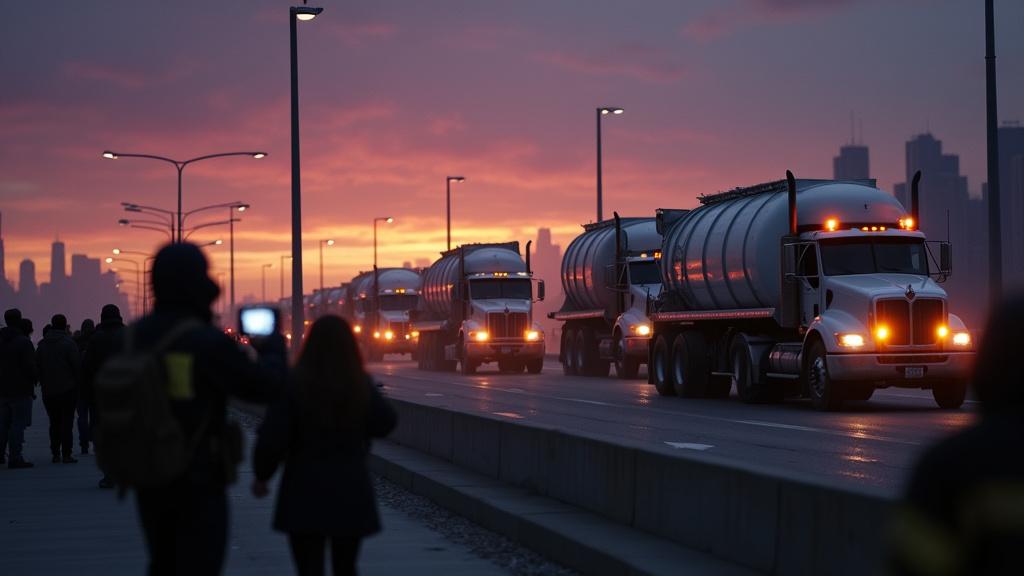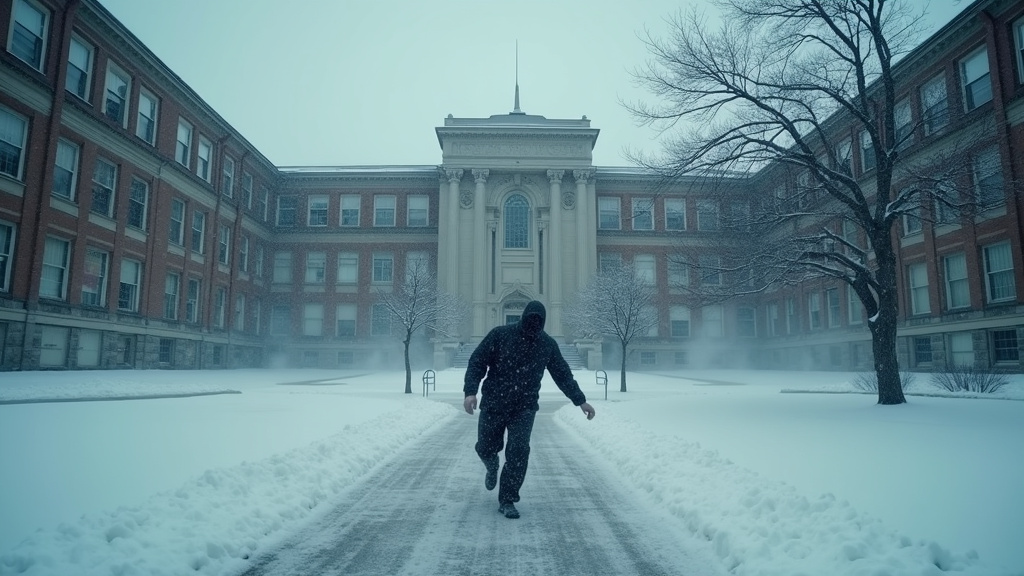CHICAGO – Tensions are sharply escalating in Chicago as former President Donald Trump signals a significant federal intervention, including the potential deployment of troops and Immigration and Customs Enforcement (ICE) agents. The rhetoric, amplified through provocative social media posts, has drawn swift and strong condemnation from Illinois’ top officials and local leaders, setting the stage for a potential legal and political showdown.
Trump’s Provocative Social Media Barrage
Central to the rising friction is a recent AI-generated image shared by Trump on his Truth Social platform. The image depicts Trump in a military-style hat against a backdrop of a burning Chicago skyline with helicopters, a visual parody of the Vietnam War film “Apocalypse Now.” The accompanying caption read, “‘I love the smell of deportations in the morning… Chicago about to find out why it’s called the Department of WAR.'” This message, which went viral, was further underscored by Trump’s executive order to rename the Department of Defense to the Department of War, a move that requires congressional approval.
While Trump later attempted to downplay the aggressive tone, stating, “We’re not going to war. We’re going to clean up our cities,” and framing it as “common sense” in response to crime, the initial threat has left an indelible mark. He had previously declared, “We’re going in” to Chicago, though without specifying a timeline, indicating a determined federal approach to address crime and immigration.
Escalating Federal Enforcement Plans
The stated objective behind the proposed federal action is to conduct a crackdown on crime and illegal immigration, mirroring operations previously seen in cities like Los Angeles and Washington, D.C. Reports indicate that Naval Station Great Lakes, located north of Chicago, is being prepared as a staging area for up to 250 federal agents and equipment for a potential 30-day operation, suggesting a prolonged enforcement presence. The Department of Homeland Security (DHS) has indicated a broad sweep, stating, “Under President Trump and Secretary Noem, nowhere is a safe haven for criminal illegal aliens.”
Fierce Opposition from Illinois Leaders
Governor JB Pritzker of Illinois has been a vocal opponent, vowing to file a lawsuit to block any federal deployment. He has denounced the plan as “nefarious,” “un-American,” and characteristic of a “wannabe dictator.” Governor Pritzker has also stated that Illinois “won’t be intimidated” by such threats and expressed concern that federal agents might target Mexican Independence Day celebrations.
Chicago Mayor Brandon Johnson has echoed this strong opposition, calling Trump’s threats “beneath the honor of our nation” and accusing him of seeking to “occupy our city and break our constitution.” In a decisive move, Mayor Johnson signed an executive order directing the Chicago Police Department to cease cooperation with federal agents involved in a potential crackdown on crime and immigration, asserting the city’s right to resist what he deems an “unconstitutional and illegal military occupation.”
Other prominent Democrats, including U.S. Senator Dick Durbin, have also condemned Trump’s rhetoric, labeling his social media post as “disgusting” and an “embarrassment.”
Chicago Reacts: Fear, Defiance, and Protests
The escalating rhetoric has prompted significant reactions within Chicago. Protests have been organized against the potential immigration raids and federal intervention, with thousands taking to the streets to voice their opposition. Some Mexican festivals in the Chicago area were postponed or canceled due to heightened fears of immigration raids. Churches across the city are also responding, urging calm resistance and preparing congregants with advice on how to stay safe and connected amidst the uncertainty.
The Underlying Data and Legal Questions
While Trump has cited high crime rates, particularly weekend violence, as a justification for federal intervention, official data presents a different picture. Chicago Police Department statistics indicate that homicides were down 31% through the end of August compared to the same period in 2024, and overall violent crime has been on a downward trend, reaching some of the lowest levels in four decades.
The legal basis for such federal deployments also remains contentious. A federal judge previously ruled that Trump’s deployment of National Guard troops to Los Angeles violated federal law, and the Posse Comitatus Act generally restricts the use of the military for domestic law enforcement.
Conclusion
As Chicago braces for a potential federal surge, the city finds itself at the nexus of a significant federal-state conflict. Governor Pritzker’s commitment to legal challenges, Mayor Johnson’s executive actions, and the palpable concern and organized resistance from residents highlight a deep divide. The TOP NEWS of this developing situation remains the question of whether and how federal forces will be deployed, and the inevitable legal and civil rights battles that are likely to follow. The HEADLINE-grabbing social media posts have ignited a critical conversation about federal authority versus local governance, a narrative that continues to unfold in this major American city. This is a story that is sure to go VIRAL across national news outlets.














